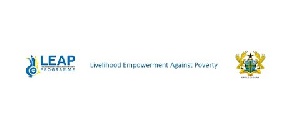The Department of Social Welfare (DSW) has cautioned its officers engaged under the Livelihood Empowerment Against Poverty (LEAP) programme, allegedly collecting monies from beneficiaries, to stop the practice.
Mr. Emmanuel Kingsford Anipah, the Brong-Ahafo Regional Director of the DSW, who gave the warning, said officers who would be caught indulging in the crime would be sanctioned accordingly.
In an interview with the Ghana News Agency on the sidelines of a two-day case management training workshop on the LEAP programme at Abesim, near Sunyani, Mr. Anipah said his outfit had received complaints on the alleged extortion of monies from beneficiaries of the programme.
He said officers of the Department were reportedly conniving with Community LEAP Implementation Committees to engage in the corrupt practice.
“Our only worry is, the complainants call the office on phones but they refuse to give their identities to enable us to contact them, making investigations into the allegations difficult,” Mr. Anipah said.
Sixty-six district directors of the Department of Social Welfare, drawn from selected Metropolitan, Municipal and District Assemblies in the country attended the training workshop organised by the LEAP Management Secretariat.
It is aimed at equipping and positioning the participants to be able to identify challenges impeding the implementation of the LEAP programme.
Mr Anipah expressed concern about inadequate logistics and equipment, which were impeding the work of the Department, but said that should not be a yardstick for officers to extort monies from poor and vulnerable people.
LEAP is a social cash transfer programme that provides cash grant to the extremely poor households across the country. Its main aim is to alleviate short-term poverty and encourage long-term human capital development.
Beneficiaries under the programme comprise orphans and vulnerable children, persons with disability without any productive capacity and elderly persons who are 65 years and above without any form of support.
It includes pregnant women and children below two years in extreme poor households, orphanages, alleged witch camps and leprosaria.
The beneficiaries received cash ranging between GHC64 and GHC106 at specific intervals.
General News of Wednesday, 30 August 2017
Source: GNA
Department of Social Welfare warns LEAP officers against extortion
Entertainment
















